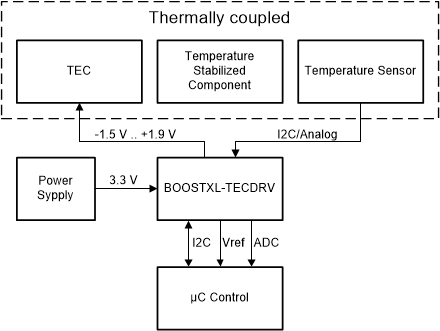SLVUBX1 December 2020 TPS63810
3 System Overview
Thermoelectric cooler (TEC) is a device that operates using the Peltier effect to create a heat flux at the junction of two different types of materials. It is a solid-state active heat pump which transfers heat from one side of the device to the other, depending on the direction of the current. Therefore, depending on the direction of the heat flow, TEC can be used for heating or for cooling.
With a feedback circuitry, TEC can be used to implement a highly stable temperature controller to maintain a precise and stable temperature of a material, component or system. A block diagram of such a controller is shown in Figure 3-1.
 Figure 3-1 TEC System Block Diagram
Figure 3-1 TEC System Block DiagramThe temperature is measured using an analog or digital temperature sensor. The sensor is interfaced to the LaunchPad through the BOOSTXL-TECDRV BoosterPack, either through the analog-to-digital converter (ADC) or through the I2C interface of the LaunchPad. The LaunchPad reads out the temperature and implements a control algorithm that generates the driving signal needed to perform temperature stabilization. The driving signal is sent back to the BoosterPack and is used to set the output voltage of the TPS63810 buck-boost converter. The TPS63810 sets the voltage across the TEC and control the direction and amount of heat flow, heating or cooling the target that is thermally coupled to the TEC.